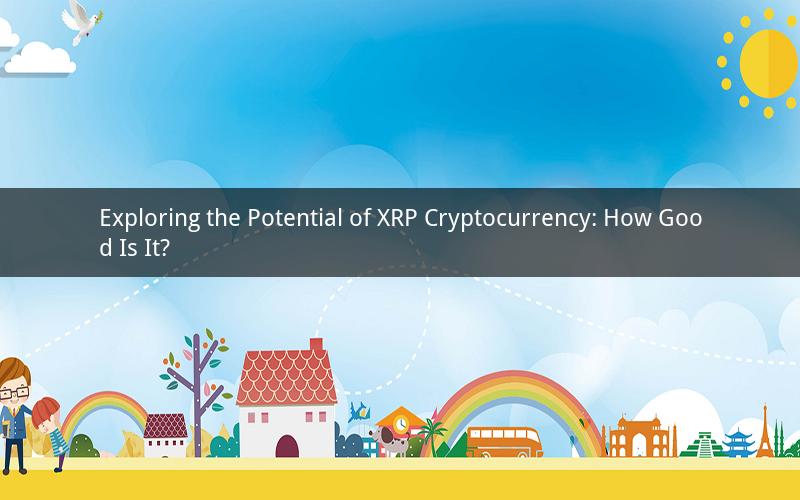
Introduction:
In the ever-evolving world of cryptocurrencies, XRP has emerged as a significant player. With its unique features and growing adoption, it is crucial to analyze how good XRP cryptocurrency truly is. In this article, we will delve into the various aspects of XRP, its benefits, challenges, and its potential for the future.
1. What is XRP Cryptocurrency?
XRP is a digital asset created by Ripple Labs Inc. It operates on a decentralized network called the XRP Ledger. XRP is designed to facilitate fast, secure, and low-cost international money transfers. Unlike Bitcoin, which aims to be a digital gold, XRP is more focused on becoming the bridge currency for cross-border payments.
2. The Advantages of XRP
2.1 Speed:
One of the standout features of XRP is its incredible transaction speed. XRP transactions are confirmed in mere seconds, compared to the average 10 minutes for Bitcoin. This speed allows for real-time transactions, making it highly beneficial for cross-border payments and micropayments.
2.2 Low Fees:
XRP transactions have extremely low fees. This is due to the unique consensus mechanism used by the XRP Ledger, which requires less computational power than traditional blockchain networks. As a result, XRP becomes an attractive option for individuals and businesses looking to minimize their transaction costs.
2.3 Energy Efficiency:
XRP consumes significantly less energy compared to other cryptocurrencies. While Bitcoin's energy consumption has been a major concern, XRP's energy-efficient algorithm ensures that it has a smaller carbon footprint. This makes XRP an environmentally friendly choice in the cryptocurrency space.
2.4 Market Adoption:
XRP has gained significant traction in the financial industry. Major banks and financial institutions, such as Santander, American Express, and MoneyGram, have partnered with Ripple Labs to implement XRP for cross-border payments. This widespread adoption suggests that XRP has the potential to become a major player in the global financial system.
3. Challenges Faced by XRP
3.1 Legal Issues:
XRP has faced legal challenges, primarily related to its classification as a security or a currency. The U.S. Securities and Exchange Commission (SEC) filed a lawsuit against Ripple Labs, claiming that XRP was sold as an unregistered security. This legal battle has created uncertainty and impacted the market perception of XRP.
3.2 Market Volatility:
Like many cryptocurrencies, XRP is subject to market volatility. Its value can fluctuate significantly, leading to potential losses for investors. This volatility can be attributed to various factors, including regulatory news, market sentiment, and competition from other cryptocurrencies.
4. The Future of XRP
4.1 Continued Development:
Ripple Labs continues to invest in the development of the XRP Ledger. They are working on improving its scalability, security, and usability. These developments are crucial for the long-term success of XRP and its adoption in the global financial system.
4.2 Regulatory Environment:
The regulatory landscape for cryptocurrencies is still evolving. As governments around the world work to regulate this new asset class, the future of XRP will depend on how it is classified and the regulations that are imposed. A favorable regulatory environment can greatly benefit XRP's adoption and market value.
4.3 Competition:
The cryptocurrency market is highly competitive, with new projects and technologies constantly emerging. XRP needs to stay innovative and adapt to changing market conditions to maintain its position as a leading cryptocurrency.
5. Questions and Answers:
Question 1: What makes XRP different from other cryptocurrencies like Bitcoin?
Answer: XRP is different from Bitcoin in terms of its purpose and features. While Bitcoin aims to be a digital gold, XRP is designed to facilitate fast, secure, and low-cost international money transfers. Its unique consensus mechanism, speed, and low fees set it apart from other cryptocurrencies.
Question 2: Can XRP be used for everyday transactions like Bitcoin?
Answer: Yes, XRP can be used for everyday transactions. Its speed and low fees make it suitable for micropayments and small-scale transactions. However, its primary use case remains in the financial industry, particularly for cross-border payments.
Question 3: How does XRP compare to Ethereum in terms of scalability?
Answer: XRP has a significant advantage over Ethereum in terms of scalability. While Ethereum struggles with high transaction fees and network congestion, XRP can process over 1,500 transactions per second. This makes XRP a more efficient option for large-scale transactions.
Question 4: Is XRP a good investment opportunity?
Answer: Whether XRP is a good investment opportunity depends on various factors, including market conditions, regulatory news, and individual risk tolerance. It is essential to conduct thorough research and consult with a financial advisor before making investment decisions.
Question 5: Can XRP replace traditional fiat currencies in the future?
Answer: While XRP has the potential to become a significant player in the global financial system, it is unlikely to replace traditional fiat currencies entirely. XRP's primary use case remains in facilitating cross-border payments and acting as a bridge currency. However, it can complement traditional fiat currencies and contribute to the evolution of the global financial system.
Conclusion:
XRP cryptocurrency has proven to be a valuable asset with its unique features, speed, and low fees. While it faces challenges and competition, its potential for growth and adoption in the financial industry remains strong. As the regulatory landscape continues to evolve, XRP's future will depend on its ability to adapt and innovate.